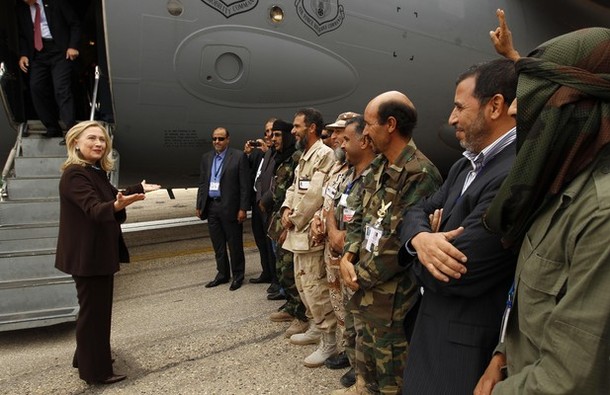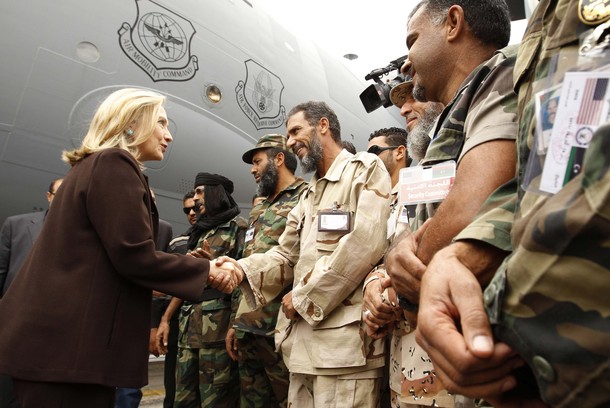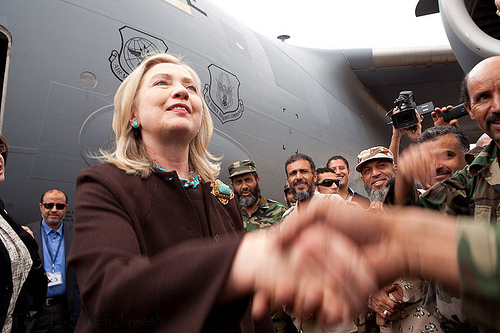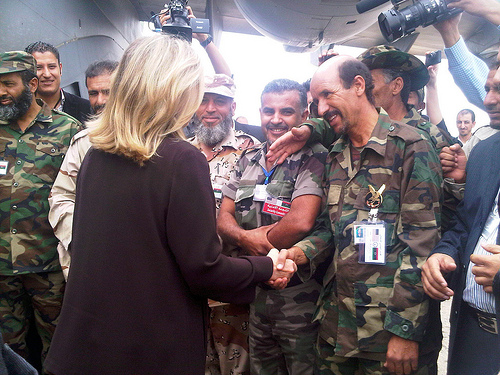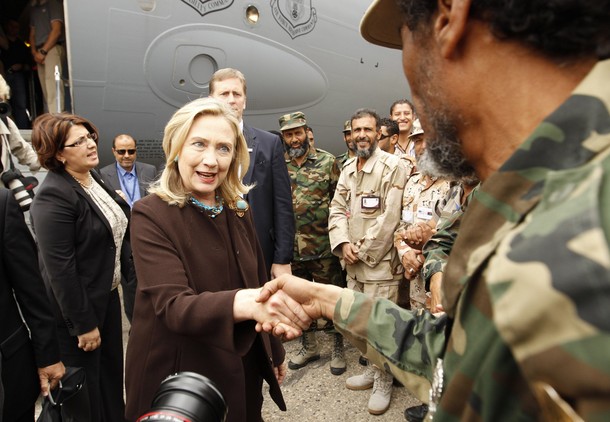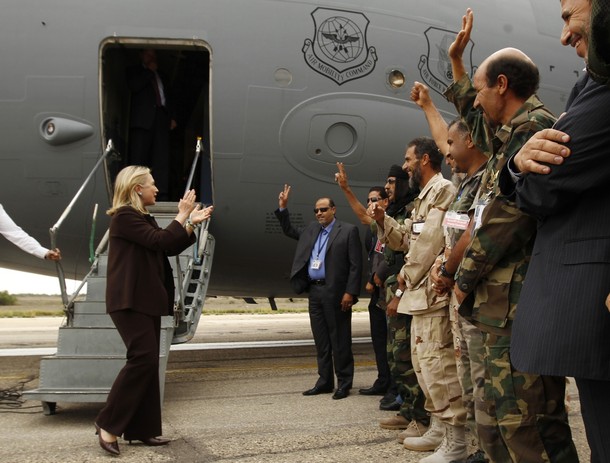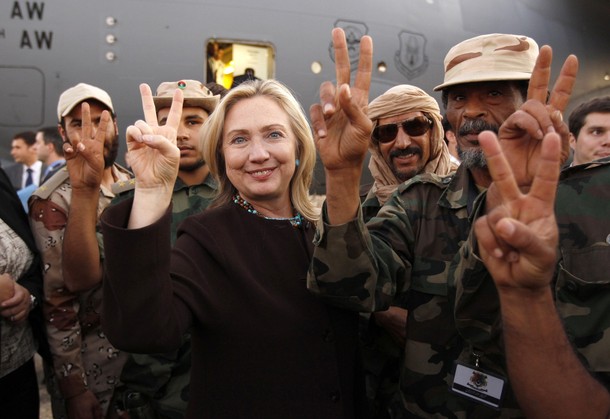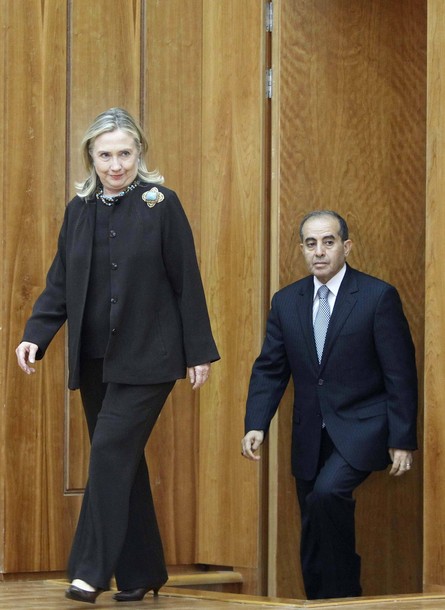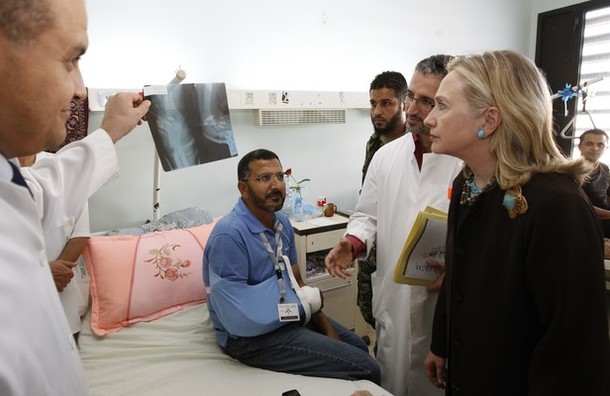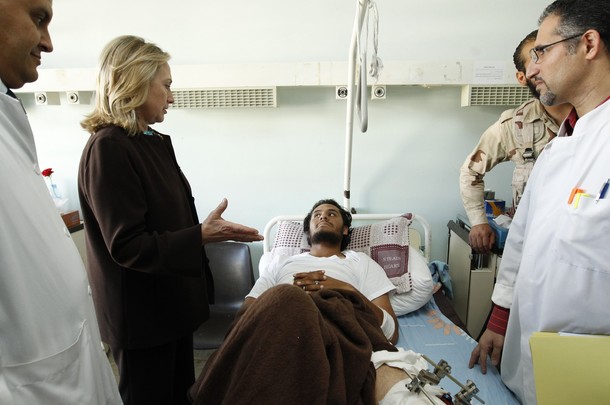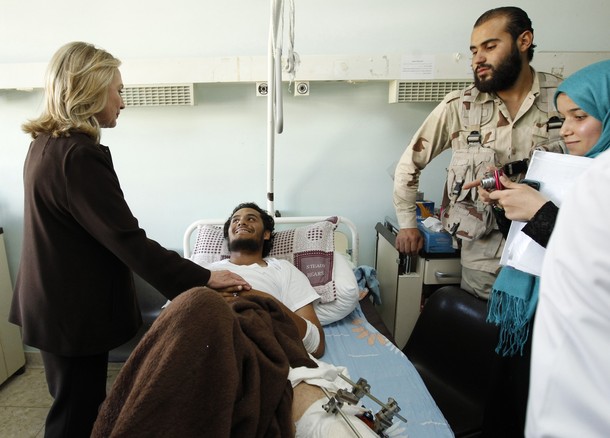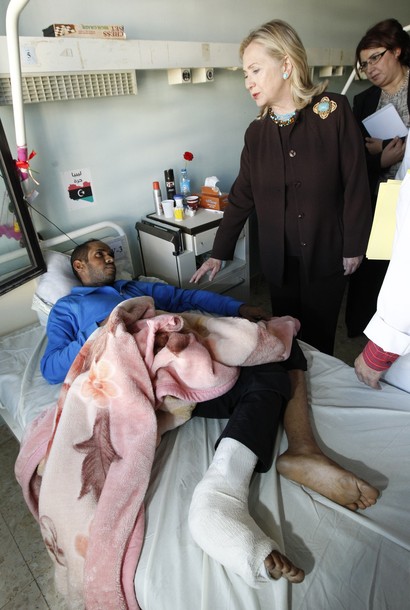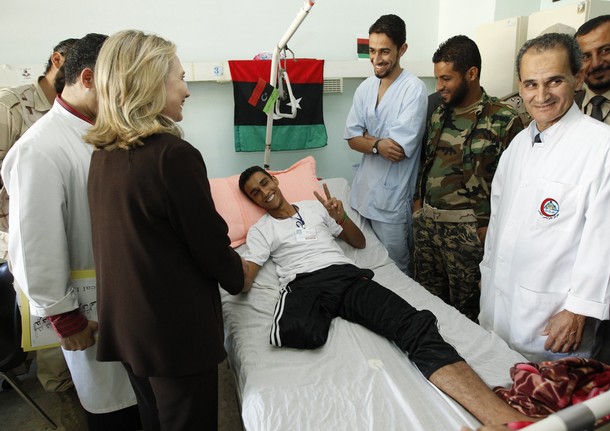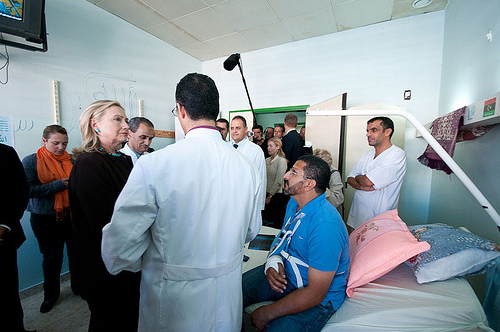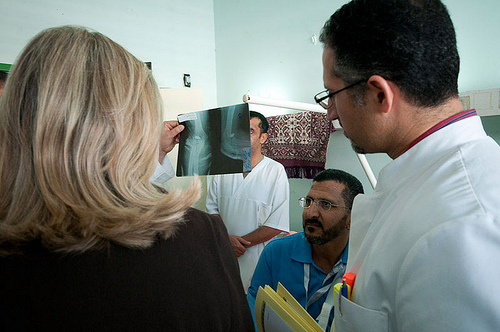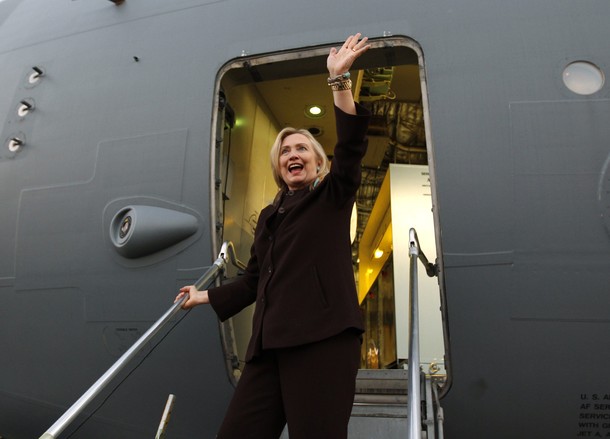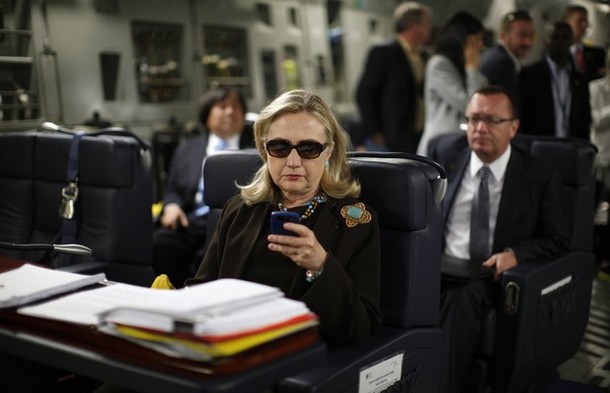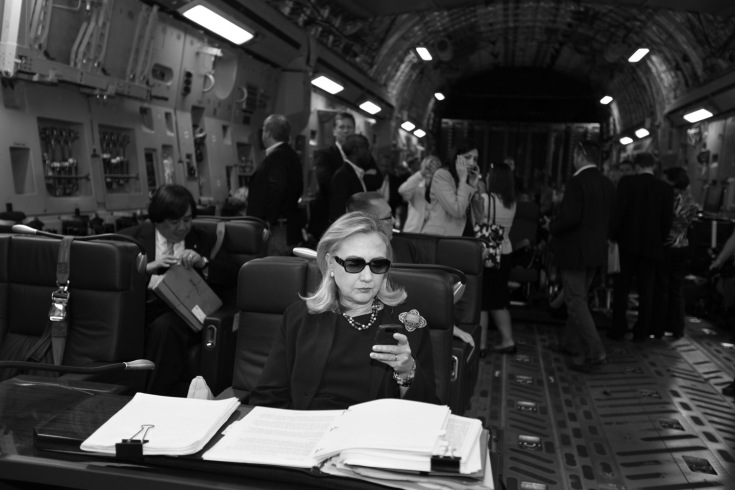Her questions:
- Would the international community unite?
- Who were the rebels?
- Were they prepared to lead?
- What was the endgame?
Hillary walks us through a brief history of the U.S. and Qaddafi including the downing of Pan Am 103 over Lockerbie, his disconcerting fixation on Condi Rice, his 2009 visit to UNGA complete with his attempt to pitch his tent in Central Park and his long rambling speech.
Suspension of United States Embassy Operations in Libya
February 25, 2011 by still4hill
Hillary Clinton: Holding the Qadhafi Government Accountable
February 26, 2011 by still4hill
We have always said that the Qadhafi government’s future is a matter for the Libyan people to decide, and they have made themselves clear. When a leader’s only means of staying in power is to use mass violence against his own people, he has lost the legitimacy to rule and needs to do what is right for his country by leaving now. Moammar Qadhafi has lost the confidence of his people and he should go without further bloodshed and violence. The Libyan people deserve a government that is responsive to their aspirations and that protects their universally recognized human rights.
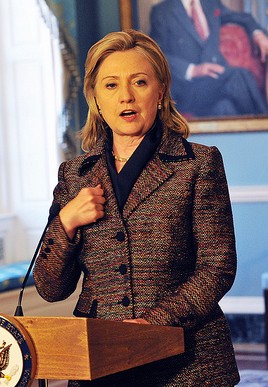
Secretary Clinton’s Remarks at the Human Rights Council
February 28, 2011 by still4hill
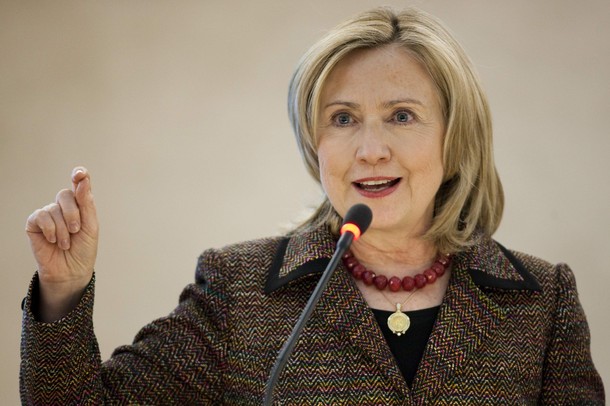
Colonel Qadhafi and those around him must be held accountable for these acts, which violate international legal obligations and common decency. Through their actions, they have lost the legitimacy to govern. And the people of Libya have made themselves clear: It is time for Qadhafi to go – now, without further violence or delay.On March 9, she met at the White house with the national security team. There was no appetite for engagement and not much hope that the one option that seemed most likely - a no fly zone - would work.
She mentions testifying before Congress on March 10. If this was the testimony, the comments she quotes occurred in the Q & A and not in her opening statements, but she did assure Congress that there were no plans for unilateral action.
Video: Secretary Clinton’s Remarks To The House Appropriations Committee
March 10, 2011 by still4hill

Secretary Clinton’s Travel to Europe and the Middle East
March 10, 2011 by still4hill
Video: Secretary Clinton’s Remarks With UAE FM Abdullah bin Zayed Al-Nahyan
March 14, 2011 by still4hill
CNN Video: Bernard-Henri Lévy Validates Hillary Clinton on Libya
March 31, 2011 by still4hill
Truth time: I have long had an intellectual crush on Lévy. He is an odd mix of philosopher-journalist, and his logic is always superbe! Speaking with Eliot Spitzer on CNN’s In The Arena tonight, he said that we should listen more to Mrs. Clinton.
On the show tonight because he is the one who convinced Sarkozy to take up the free Libyan cause, he said that he told the French President that there were French flags flying in Benghazi, and if Sarkozy did nothing, there would be blood on the French flags. What a dramatic image! Uncomplicated and true.
Slideshow: Hillary Clinton at Paris G8
March 14, 2011 by still4hill


On the ground in Cairo. Hillary mentioned the resolutions before the U.N. Security Council. There was a weak Russian-Chinese resolution and a strong French-Lebanese resolution. In the end Lavrov agreed that Russia would not to vote against the stronger one, but would simply abstain - and that was enough. The language of the stronger resolution contained the words "all necessary measures" to protect civilians. The issue was whether there was to be strictly a no fly zone or whether there was by extension a no drive zone. Would the attacks be strictly air-to-air, or would air-to-ground (seen as necessary to stop Qaddafi's ground troops from attacking rebel strongholds) be permissible?
Secretary Clinton’s Remarks With Egyptian Foreign Minister Nabil Al-Araby
March 15, 2011 by still4hill
... with regard to Libya, we welcomed the Arab League’s statement on Saturday. And I consulted with my G-8 colleagues yesterday in Paris. As you probably know, there is a British-French-Lebanese Security Council resolution that is being discussed at this time in New York. We are consulting with the Arab League about their understanding of the goals and modalities of a no-fly zone as well as other forms of support. We understand the urgency of this and therefore we are upping our humanitarian assistance. We are looking for ways to support the opposition, with whom I met last night. But we believe that this must be an international effort and that there has to be decisions made in the Security Council in order for any of these steps to go forward.After Cairo, she visited Tunisia, went back to DC briefly, and then was wheels up again for Paris. This time she arrived with an agreement to participate in a no fly zone in her very stylish bag.
In the course of reading her book and digging up the posts from the events, I have learned not to be surprised anymore when her account differs from how it was reported since she is telling the story from the inside while we observed from outside. She tells this differently, but this is the way it looked to all of us. We also have become accustomed to Hillary waiving credit for her accomplishments.
Hillary Clinton à Paris : Chapitre Deux
March 19, 2011
CNN’s John King dubbed her the “Acting President” yesterday, and no less a former adversary than MSNBC’s Chris Matthews called her the Commander-in-Chief, saying she was presidential and strong. Roger L. Simon at Pajamasmedia treated us to this header: Jets over Libya as H. Clinton Assumes Presidency.
The amazing Hillary Rodham Clinton departed Paris on Tuesday on a mission to convince the White House that participating in a No-Fly Zone was the right thing to do to protect the brave Libyan freedom fighters who have risen up against 42 years of dictatorship under the tyrant Mouammar Gadhafi. In her meetings on Monday and Tuesday, she reportedly responded to repeated requests for U.S. cooperation from various world leaders with the mantra, “There are difficulties.”
But HRC knew exactly what kind of an NFZ she wanted in order for the U.S. not to look like the cliched “world’s policeman.” She knew exactly how the coalition should be formed, and how her country should fit in. So when she returned to D.C. early Friday morning, after visits to Egypt and Tunisia, she did so with a mission. In a Situation Room meeting that morning, she finally scored her victory, winning President Obama’s agreement to participate in the coalition.
Hillary Clinton’s Press Availability in Paris
March 19, 2011 by still4hill |

America has unique capabilities and we will bring them to bear to help our European and Canadian allies and Arab partners stop further violence against civilians, including through the effective implementation of a no-fly zone. As President Obama said, the United States will not deploy ground troops, but there should be no mistaking our commitment to this effort.
The international community came together to speak with one voice and to deliver a clear and consistent message: Colonel Qadhafi’s campaign of violence against his own people must stop. The strong votes in the United Nations Security Council underscored this unity. And now the Qadhafi forces face unambiguous terms: a ceasefire must be implemented immediately – that means all attacks against civilians must stop; troops must stop advancing on Benghazi and pull back from Adjabiya, Misrata, and Zawiya; water, electricity, and gas supplies must be turned on to all areas; humanitarian assistance must be allowed to reach the people of Libya.
As you may know, French planes are already in the skies above Benghazi. Now, America has unique capabilities and we will bring them to bear to help our European and Canadian allies and Arab partners stop further violence against civilians, including through the effective implementation of a no-fly zone. As President Obama said, the United States will not deploy ground troops, but there should be no mistaking our commitment to this effort.Before the end of the month, command of the no fly zone operation was ceded by the U.S. to NATO.
Video & Transcript: Secretary Clinton’s Remarks on Transition of NFZ Command
March 24, 2011 by still4hill
In response, the UN Security Council mandated all necessary measures to protect civilians, including a no-fly zone. But the regime’s forces continued their assaults, and last weekend they reached Benghazi itself. We faced the prospect of an imminent humanitarian disaster. Hundreds of thousands of civilians were in danger. So an international coalition was compelled to act. French planes were the first to reach the skies over Benghazi. Cruise missiles from the United States and the United Kingdom followed, striking the region – the regime’s air defenses and clearing the way for allied aircraft to implement the no-fly zone.
Many other nations have now joined this effort. After only five days, we have made significant progress. A massacre in Benghazi was prevented, Qadhafi’s air force and air defenses have been rendered largely ineffective, and the coalition is in control of the skies above Libya...
Today we are taking the next step. We have agreed, along with our NATO allies, to transition command and control for the no-fly zone over Libya to NATO. All 28 allies have also now authorized military authorities to develop an operations plan for NATO to take on the broader civilian protection mission under Resolution 1973.
Secretary Clinton To Travel to London, United Kingdom
March 24, 2011 by still4hill
Secretary of State Hillary Rodham Clinton will travel to London, United Kingdom, March 29 to attend an international conference to discuss the Libyan crisis, including ongoing implementation of United Nations Security Council Resolutions 1970 and 1973 and the humanitarian needs of those affected by the conflict.
Hillary Clinton: Remarks at the International Conference on Libya
March 29, 2011 by still4hill
Thank you very much, Prime Minister, and thanks to you and your government for the critical leadership effort you have demonstrated in our common effort. Thanks too to France, which has been at the forefront of this mission, including by hosting many of us last week in Paris, and really thanks to everyone around this table. We have prevented a potential massacre, established a no-fly zone, stopped an advancing army, added more partners to this coalition, and transferred command of the military effort to NATO. That’s not bad for a week of work at a time of great, intense international concern...
We believe that Libya’s transition should come through a broadly inclusive process that reflects the will and protects the rights of the Libyan people. The Transitional National Council and a broad cross-section of Libya’s civil society and other stakeholders have critical contributions to make...
This is a time of great change for Libya, for its neighbors across the region and around the world. Under different governments, under different circumstances, people are expressing the same basic aspirations – a voice in their government, an end to corruption, freedom from violence and fear, the chance to live in dignity, and to make the most of their God-given talents. Now, we know these goals are not easily achieved, but they are, without question, worth working for together. And I’m very proud that this coalition has come to this place at this time to try to pursue those goals.
Hillary Clinton: Remarks After the International Conference on the Libyan Crisis
March 29, 2011 by still4hill




In late August, Qaddafi fled.
Secretary Clinton’s Statement on Libya
August 25, 2011 by still4hill

Secretary Clinton’s Travel to Paris
August 29, 2011 by still4hill
Secretary of State Hillary Rodham Clinton will travel to Paris, France September 1 to participate in a senior-level meeting of the Contact Group on Libya.
Secretary Clinton: A New Future Dawning in Libya
September 1, 2011 by still4hill
Well, this is my ninth trip to discuss the current crisis in Libya, and each time I have urged that our partners stay focused on the ultimate objective of helping the Libyan people chart their way to a better future. And today, that future is within their reach. All of us are inspired by what is happening in Libya.
Six months ago, Libyans stood up to demand fundamental rights and freedom. And when Qadhafi met their peaceful protest with violence, the Libyan people refused to back down. While their struggle is not over, the Libyan people are taking back their country. Libya’s transformation is the – largely the result of their own courage and their resilience in the face of very difficult days. The sacrifice that the Libyan people have been willing to make in order to obtain freedom and dignity has been extraordinary.
The
next month Hillary visited Malta and Libya. Malta, of
course, had been a way station for Americans evacuated in February and
deserved a grateful visit. From Malta, she proceeded to Libya.
Secretary Clinton: Wheels Down in Malta
October 17, 2011 by still4hill




Landing in Libya, she was apprehensive but received a warm reception from the militia.
Mahmoud Jibril, with whom she had met in Paris in March, was the transitional Prime Minister.
Video: Secretary Clinton with TNC Prime Minister Jibril in Tripoli
October 18, 2011 by still4hill
I am proud to stand here on the soil of a free Libya. And on behalf of the American people I congratulate all Libyans. It is a great privilege to see a new future for Libya being born. And indeed, the work ahead is quite challenging, but the Libyan people have demonstrated the resolve and resilience necessary to achieve their goals.
One of those challenges was coalescing so many disparate militias into a single military force under civilian authority, Hillary points out. Transitional Council leaders agreed with her. As we know, as of this writing, that never happened and is the reason that today Libya is in chaos with numerous militias battling each other and two parliaments. Again our embassy is evacuated.
Secretary Clinton’s Town Hall Meeting in Tripoli
October 18, 2011 by still4hill
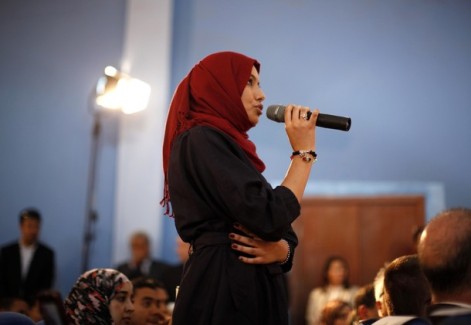
She also visited a hospital.
Our embassy had been ransacked. They were running embassy services and operations out of the Ambassador's residence.
Secretary Clinton’s Embassy Meet-and-Greets in Valletta and Tripoli
October 18, 2011 by still4hill
Then she was wheels-up and out.
In the book, Hillary explains that from Malta to Libya and back they flew in a C-17 cargo transport because of the many shoulder-to-air weapons on the ground in Libya and the obvious markings on her plane. I can attest that these are very visible. When I lived in Haiti, then U.N. Ambassador Andrew Young visited and flew in a similar plane. When his flight was leaving I could, from my gallerie, clearly see the words "The United States of America" on his plane as it took off over the Gulf of La Gonave. My heart burst with pride to see it. It was wise not to send her "Big Blue Bird" into possible danger.
She notes that on the flight to Libya from Malta this happened.
Original image by Kevin Lamarque for Reuters.
Original image by Diana Walker for Time.
Leading to this: Texts From Hillary

And ultimately this!
Despite all the fun generated by those pics of Hillary "running the world," she left Libya that day soberly worried about its future.
She had been forced in late 2010 to recall Ambassador Gene Cretz, quite a character as portrayed in her book, because of credible threats against him. Chris Stevens, an expert on Libya, former envoy to the rebels in Benghazi during the revolution, and very enthusiastic supporter of their cause, accepted the job with gusto. Anyone who has seen his video introducing himself to the people of Libya as the new American Ambassador can see that.
The attacks on our outposts in Benghazi were not the last of the problems engendered by a new government unable to wrangle the many militias. As I write, Embassy Tripoli is once again evacuated. Everyone has seen the videos by now. None of that is for clouded vision on Hillary's part or anyone else's. Our mission, always, is to go to the dangerous places and to try to talk and reason with people.
__________________________________________________________
Hillary Clinton’s ‘Hard Choices’ Retrospective: Introduction
__________________________________________________________####












